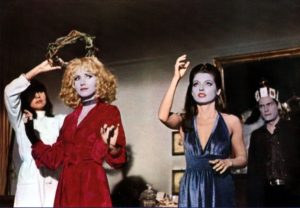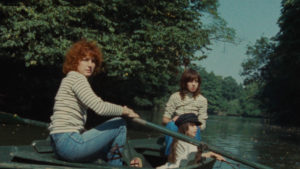STUDIO: Criterion | DIRECTOR: Jacques Rivette | CAST: Juliet Berto, Dominique Labourier, Bulle Ogier, Marie-France Pisier, Barbet Schroeder
RELEASE DATE: 3/16/21 | PRICE: DVD $22.94, Blu-ray $27.99
BONUSES: Audio commentary from 2017 with critic Adrian Martin; “Jacques Rivette: Le veilleur,” a 1994 feature documentary by Claire Denis; new interviews with actor Bulle Ogier and producer/actor Barbet Schroeder; new conversation between critic Pacôme Thiellement and Hélène Frappat; archival interviews with Rivette, Ogier, and actors Juliet Berto, Dominique Labourier, and Marie-France Pisier
SPECS: NR | 193 min. | Foreign language comedy fantasy | 1.37:1 | monaural
This package has been long awaited by fans of French cinema and most especially by fans of its director, the “least-known” New Wave filmmaker, Jacques Rivette (Around a Small Mountain, The Nun, La Pont du Nord). It can be debated whether Celine and Julie Go Boating (1974) is his best film, but it is inarguably the best “first Rivette” to show someone unfamiliar with his work.
Its length is deceptive — it’s actually one of the breeziest three-and-a-quarter hour films ever made and, as with all of Rivette’s other greatest works, it may seem slow and puzzling at first, but its pace picks up a short way in and it never lets go.
The plot is also a deceptive bit of sleight of hand storytelling. It initially is about the growing friendship between drifter and tall-tale teller Celine (Juliet Berto, La Chinoise) and common sense librarian Julie (Dominique Labourier). We soon learn about a mysterious house that the women are dreaming about, and then discover on the edge of town.
In this house a bizarre melodrama is taking place (with a plot that comes from a Henry James novel). Two women (Discreet Charm of the Bourgeoisie‘s Bulle Ogier and Trans-Europ-Express‘s Marie-France Pisier) are competing for a widower (played by the film’s producer, Barbet Schroeder) and they plot to kill his young daughter so he will be free of any entanglements. Celine and Julie decide to enter that storyline and save the little girl. The “open, sesame!” door-opener is a certain sweet candy that puts them inside the drama in the house.
The above sounds dense, but the film moves along as light as air — a fairy tale, a female bonding comedy, a fantasy shot in real locations, and a wonderfully entertaining exercise in experimental storytelling. For the house itself becomes a key character in the film, as Celine and Julie vow to alter the outcome of the melodrama (which, while literary in origin, is played like both “high” theater and silent cinema).
There are several utterly brilliant aspects to the film, including nightclub magic acts performed by both leads. Celine’s is straightforward, while Julie’s mocks the male spectators who come looking for a “bit more” from her. But the single most impressive aspect, which only become apparent on reviewing the picture, is how the pair not only become actors in the drama in the house, but they also serve as authors, directors, audience members, and critics of the drama as well.
The last aspect is nearly tucked into the plot, but it also was an organic outgrowth of the fact that Rivette (who came up with the central plot) and co-scripter Eduardo de Gregorio (who devised the Henry James plot) were ably assisted on dialogue and action by the four lead actresses.
This is chronicled in detail in the supplements found in this package — which, again, has been long-awaited, since the film went “MIA” in the U.S. with the closure of the distributor New Yorker Films in 2009. One hopes the other two major French masterpieces that have disappeared from view since that company died out — Eustache’s The Mother and the Whore and Rivette’s L’Amour Fou — will finally be restored and emerge on disc sometime soon.
Three new supplements are present in the package, all of them shot on what appears to be the Zoom app. Bulle Ogier speaks about her role in the film and how she performed it as if she was in a silent film; in the meantime, she and the other actors making the “house” story had no idea what had been shot for the Celine and Julie sequences. She remarks that, while the film was indeed a strong collaboration, Rivette “pulled all the strings, like a magician.”
Producer/supporting actor Barbet Schroeder (Amnesia) discusses his film company Les Films du Losange (co-founded with Eric Rohmer in 1962) and how their mission was to find money to make otherwise “unproduceable” films. He chuckles when remembering that Rivette swore to him that Celine and Julie would not run over two hours (as his preceding project, Out 1, was a 13-hour telefilm that was rejected by French TV). On the other hand, he recalls with some glee that the film was immensely popular in France, demonstrating that people would go to see a 195-minute feature.
Film historians Pacôme Thiellement and Hélène Frappat participate in a Zoom conversation in which they analyze the film from several perspectives. Thiellement notes the “immense joy” that permeates the picture and also emphasizes the fact that both Celine and Julie do something “destructive” that turns out to be positive for each other, when Celine rejects an ex of Julie’s to get him out of her life and Julie performs Celine’s nightclub magic act.
Frappat posits Rivette as a feminist filmmaker who “only made films about women.” She also notes that he made films “as if he were a woman” (calling him “she” in the process). His greatest discovery in Celine and Julie? The “idea that to film a woman it takes two.” She mentions the different roles that Celine and Julie take on in the drama taking place in the house and lastly notes that Rivette’s approach follows a quote from Rossellini, with which he was enamored, to the effect that “the viewer finishes the film.”
 The most valuable inclusion is Claire Denis’ low-key 1994 portrait of Rivette called Jacques Rivette – Le Veilleur (the Watchman). Denis chose to have critic Serge Daney interview Rivette on-camera for the duration of the doc, and instead of pursuing a chronological discussion of Rivette’s life and work, Daney talks with the extremely mellow, perpetually shrugging filmmaker about his approach to filmmaking and life.
The most valuable inclusion is Claire Denis’ low-key 1994 portrait of Rivette called Jacques Rivette – Le Veilleur (the Watchman). Denis chose to have critic Serge Daney interview Rivette on-camera for the duration of the doc, and instead of pursuing a chronological discussion of Rivette’s life and work, Daney talks with the extremely mellow, perpetually shrugging filmmaker about his approach to filmmaking and life.
In the process Rivette discusses the period where he journeyed to Paris and became friends with his critic-turned-filmmaker colleagues — he credits Truffaut for pushing him to make and then complete his troubled first feature, Paris Belongs to Us (1961). Daney asks Rivette about his private life, which was notoriously quiet and solitary — Rivette responds by talking about how he enjoys riding the Paris Metro alone, going to movies, and reading the newspaper. He exhibits genuine pleasure, though, when describing the fan mail he’s gotten from viewers around the world who were moved by his films — he describes them as “a secret society.”
Two French TV segments from 1974 offer a contemporary look at how the film was explained to the public. A segment about films that played Cannes that year finds three of the lead actresses discussing how they contributed to the script and how they functioned as two separate teams (Berto/Labourier and Ogier/Pisier). Another segment finds Rivette sitting with the same actresses discussing how the film was “a vacation movie,” as it was shot in Paris during the summer, and how it could be seen as a film about “actresses who want to make a film together.”
A trio of interviews from 2004 find three of the actresses (a different permutation from the TV clips) interviewed separately. Ogier discusses how she was chosen for her part not by Rivette but Berto and Labourier. She comments on the stylization in the “house” sequences by declaring that “artifice is not difficult” for a performer to conjure up. As one of the performers who worked the most with Rivette, she states with some authority that the creation of his films “may seem easy, but it’s not.”
Labourier (seen in the 2004 videos for the only time in the package) notes that the movie was conceived of as a game with “principles of play” at work. She remembers how Berto moved in with her for the duration of the shoot, so they could work on their dialogue and action each night after the filming stopped. She reflects that the “most liberated” works of art have to be “the most constructed.”
Rivette is interviewed alone in two vintage clips, the first of which finds him discussing the “game” aspect of titling Celine and Julie and his other films. A more enlightening, lengthier clip has him discussing the genesis of the project — it came to be because a period piece that was to costar Jeanne Moreau with Juliet Berto never got out of the planning stages. He therefore decided to work with Berto and Labourier on a comedy taking place in Paris during the summer. He notes that he didn’t intend the sweet candy that the women take to enter the world of the house to represent a kind of drug but that it has often been interpreted that way.
He also declares with characteristic good nature that, when it comes to viewers’ perspectives on the film, “All interpretations are right!”
|
Buy or Rent Celine and Julie Go Boating
|
|---|

Leave a Reply